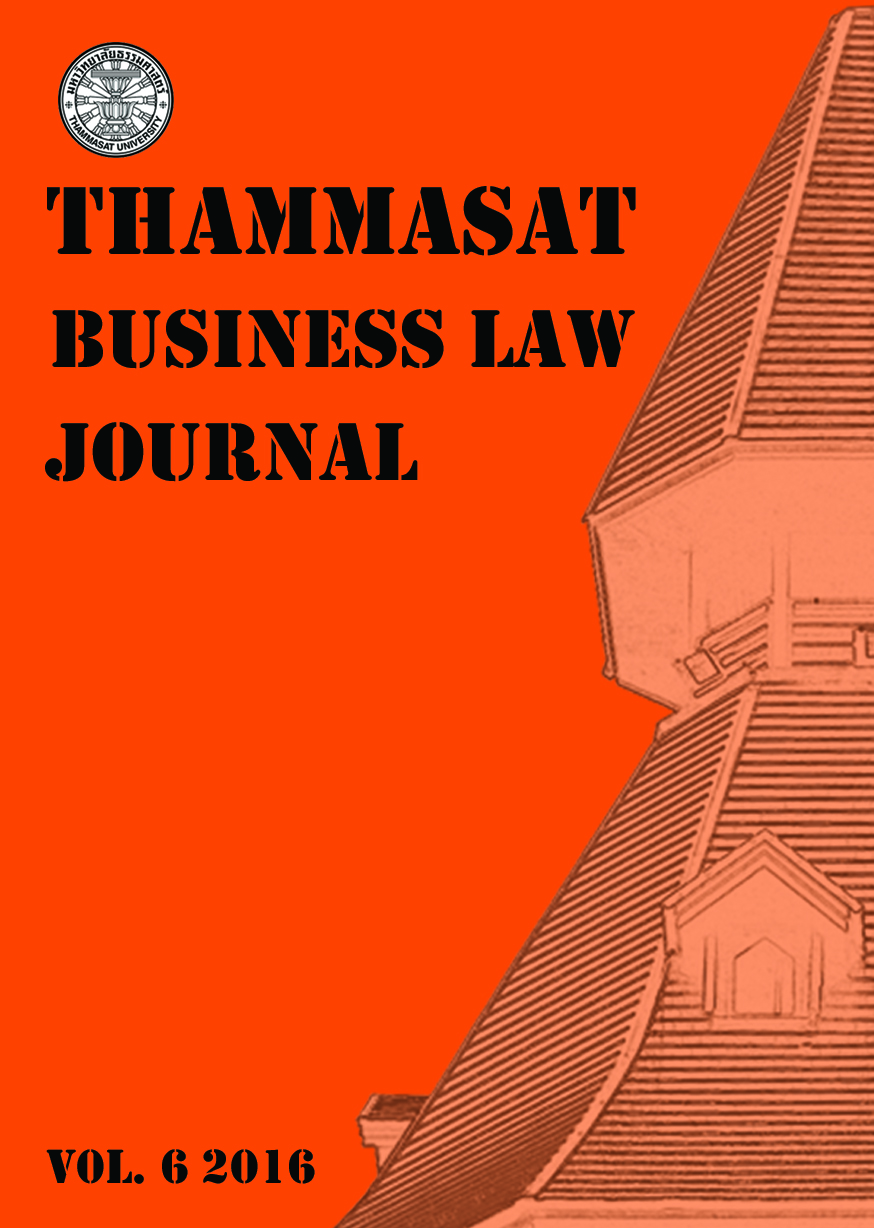CLICKBAITS LIABILITY UNDER COPYRIGHT LAW IN THAILAND
Main Article Content
Abstract
At present, the internet has become one of the most important information sources. Moreover, the price of communication devices is cheaper than before. Therefore, people are able to access interesting information via internet. Unfortunately, some people who understands a modernist behavioral lifestyle has discovered a method earning money from this and seeks benefit by using a tactic called “Clickbait”.
“Clickbait” consisted of two words. One is “click” means “an instance of selecting an item in a website or app by clicking or tapping on a mouse, touchscreen, or other input device.” Another is “bait” means “to entice or provoke, especially by trickery or strategy.” Once they are merged, it means “[a] provocative or sensationalistic headline text that entices people to click on a link to an article, used as publishing tactic to increase webpage views and associated ad revenue.”
Because clickbait websites aim only on increasing webpage views, hence, it needs more and more contents to fulfill its sites. Unfortunately, many of these sites do not create contents by themselves, but steals contents from legitimate and hardworking authors. This execution may deem as a copyright infringement.
After conducting comparative study on Thai and foreign copyright laws, namely US law and UK law, it was found that clickbait websites are not in favor of fair use and fair dealing doctrine and being considered as a copyright infringement. Furthermore, it was found that the US law is effective to tackle online copyright infringed contents and suitable for applying to click-baiting offences.
In Thailand, the Thai Copyright Act B.E.2537 (1994) is a main statute to deal with copyright infringement offence. Even though it was recently amendment in B.E.2558 (2015) but it is unable to tackle click-baiting problems effectively, since clickbait websites abruptly generate a huge amount of income to clickbait website owner within a short period. In addition, the Computer Crime Act B.E.2550 (2007) has no measure for tackling online copyright infringed contents. Thus, the revision of the Thai Laws should be seriously taken into consideration. In this regard, the author provided not only proposed solutions to resolve this fashionable issue but also a recommendation format for a good digital online content.
Article Details
References
“Clickbait คืออะไร? ทำไมเราไม่ควร Click?” Obassblog. นำข้อมูลขึ้นเมื่อวันที่ 28 มิถุนายน 2558. http://obass.orgfree.com/index.php/2015/06/28/clickbait/ (สืบค้นเมื่อวันที่ 11 พฤษภาคม 2559) (“What is Clickbait? Why We Should Avoid It?” Obassblog. Entry posted June 28, 2015. http://obass.orgfree.com/index.php/2015/06/28/clickbait/ (accessed May 11, 2016)).
Intellectual Property Office. “Exceptions to Copyright.” June 12, 2014. https://www.gov.uk/guidance/exceptions-to-copyright (accessed December 10, 2015).
U.S. Copyright Office Summary. “The Digital Millennium Copyright Act of 1998.” www.copyright.gov/legislation/dmca.pdf (accessed December 10, 2015).
The Free Dictionary by Farlex. http://www.thefreedictionary.com/click (accessed June 19, 2015).
Yugioh2500. “เว็บไซต์พอร์ทัล (Web Portal) คืออะไร? มาทำความรู้จักกัน.” นำข้อมูลขึ้นเมื่อวันที่ 11 กันยายน 2557. http://ireview.in.th/what-is-a-web-portal/ (สืบค้นเมื่อวันที่ 9 มิถุนายน 2558) (Yugioh2500. “What is Web Portal? Let’s Know About It.” September 11, 2014. http://ireview.in.th/what-is-a-web-portal/ (accessed June 9, 2015)).
“หายนะออนไลน์ ‘เว็บปรสิต’ ก๊อปข่าวจนยอดวิวกระจาย!” ASTV ผู้จัดการรายวัน, 10 พฤษภาคม 2558. http://www.manager.co.th/Daily/ViewNews.aspx?NewsID=9580000053326 (สืบค้นเมื่อวันที่ 17 พฤษภาคม 2559) (“Online Disaster: ‘Parasite Web’ Earned Webpage Views from Stolen Contents!” ASTV Daily Manager, May 10, 2015. http://www.manager.co.th/Daily/ViewNews.aspx?NewsID=9580000053326 (accessed May 17, 2016)).


